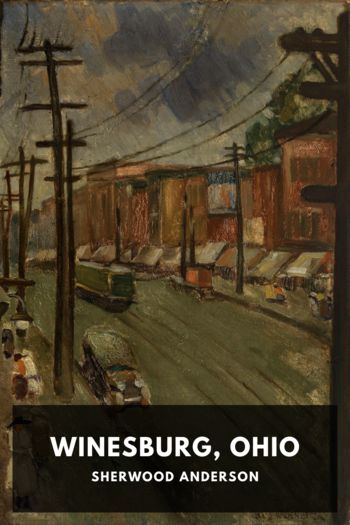Winesburg, Ohio, Sherwood Anderson [web based ebook reader txt] 📗

- Author: Sherwood Anderson
Book online «Winesburg, Ohio, Sherwood Anderson [web based ebook reader txt] 📗». Author Sherwood Anderson
All men lead their lives behind a wall of misunderstanding they have themselves built, and most men die in silence and unnoticed behind the walls. Now and then a man, cut off from his fellows by the peculiarities of his nature, becomes absorbed in doing something that is personal, useful and beautiful. Word of his activities is carried over the walls.
These “walls” of misunderstanding are only seldom due to physical deformities (Wing Biddlebaum in “Hands”) or oppressive social arrangements (Kate Swift in “The Teacher”). Misunderstanding, loneliness, the inability to articulate, are all seen by Anderson as virtually a root condition, something deeply set in our natures. Nor are these people, the grotesques, simply to be pitied and dismissed; at some point in their lives they have known desire, have dreamt of ambition, have hoped for friendship. In all of them there was once something sweet, “like the twisted little apples that grow in the orchards in Winesburg.” Now, broken and adrift, they clutch at some rigid notion or idea, a “truth” which turns out to bear the stamp of monomania, leaving them helplessly sputtering, desperate to speak out but unable to. Winesburg, Ohio registers the losses inescapable to life, and it does so with a deep fraternal sadness, a sympathy casting a mild glow over the entire book. “Words,” as the American writer Paula Fox has said, “are nets through which all truth escapes.” Yet what do we have but words?
They want, these Winesburg grotesques, to unpack their hearts, to release emotions buried and festering. Wash Williams tries to explain his eccentricity but hardly can; Louise Bentley “tried to talk but could say nothing”; Enoch Robinson retreats to a fantasy world, inventing “his own people to whom he could really talk and to whom he explained the things he had been unable to explain to living people.”
In his own somber way, Anderson has here touched upon one of the great themes of American literature, especially Midwestern literature, in the late nineteenth and early twentieth centuries: the struggle for speech as it entails a search for the self. Perhaps the central Winesburg story, tracing the basic movements of the book, is “Paper Pills,” in which the old Doctor Reefy sits “in his empty office close by a window that was covered with cobwebs,” writes down some thoughts on slips of paper (“pyramids of truth,” he calls them) and then stuffs them into his pockets where they “become round hard balls” soon to be discarded. What Dr. Reefy’s “truths” may be we never know; Anderson simply persuades us that to this lonely old man they are utterly precious and thereby incommunicable, forming a kind of blurred moral signature.
After a time the attentive reader will notice in these stories a recurrent pattern of theme and incident: the grotesques, gathering up a little courage, venture out into the streets of Winesburg, often in the dark, there to establish some initiatory relationship with George Willard, the young reporter who hasn’t yet lived long enough to become a grotesque. Hesitantly, fearfully, or with a sputtering incoherent rage, they approach him, pleading that he listen to their stories in the hope that perhaps they can find some sort of renewal in his youthful voice. Upon this sensitive and fragile boy they pour out their desires and frustrations. Dr. Parcival hopes that George Willard “will write the book I may never get written,” and for Enoch Robinson, the boy represents “the youthful sadness, young man’s sadness, the sadness of a growing boy in a village at the year’s end [which may open] the lips of the old man.”
What the grotesques really need is each other, but their estrangement is so extreme they cannot establish direct ties—they can only hope for connection through George Willard. The burden this places on the boy is more than he can bear. He listens to them attentively, he is sympathetic to their complaints, but finally he is too absorbed in his own dreams. The grotesques turn to him because he seems “different”—younger, more open, not yet hardened—but it is precisely this “difference” that keeps him from responding as warmly as they want. It is hardly the boy’s fault; it is simply in the nature of things. For George Willard, the grotesques form a moment in his education; for the grotesques, their encounters with George Willard come to seem like a stamp of hopelessness.
The prose Anderson employs in telling these stories may seem at first glance to be simple: short sentences, a sparse vocabulary, uncomplicated syntax. In actuality, Anderson developed an artful style in which, following Mark Twain and preceding Ernest Hemingway, he tried to use American speech as the base of a tensed rhythmic prose that has an economy and a shapeliness seldom found in ordinary speech or even oral narration. What Anderson employs here is a stylized version of the American language, sometimes rising to quite formal rhetorical patterns and sometimes sinking to a self-conscious mannerism. But at its best, Anderson’s prose style in Winesburg, Ohio is a supple instrument, yielding that “low fine music” which he admired so much in the stories of Turgenev.
One of the worst fates that can befall a writer is that of self-imitation: the effort later in life, often desperate, to recapture the tones and themes of youthful beginnings. Something of the sort happened with Anderson’s later writings. Most critics and readers grew impatient with the work he did after, say, 1927 or 1928; they felt he was constantly repeating his gestures of emotional “groping”—what he had called in Winesburg, Ohio the “indefinable hunger” that prods and torments people. It became the critical fashion to see Anderson’s “gropings” as a sign of delayed adolescence, a failure to develop as a writer. Once he wrote a chilling reply to those who dismissed him





Comments (0)